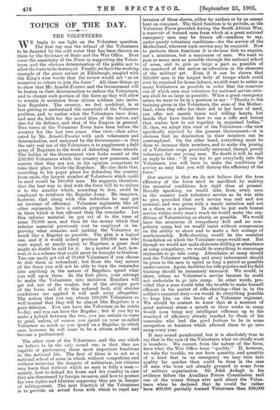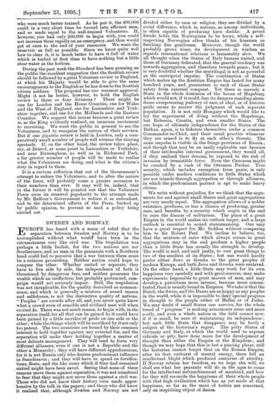TOPICS OF THE DAY.
E begin to see light on the Volunteer question. The first ray was the refusal of the Volunteers to be daunted by the cold water that has been thrown on them by the Secretary of State and the War Office. Next came the unanimity of the Press in supporting the Volun- teers, and the obvious determination of the public not to allow the force to be destroyed. Finally, we have the working example of the great review at Edinburgh, coupled with the King's wise words that the review would act " as an incentive to others to join the force." All these things go to show that Mr. Arnold-Forster and the Government will be beaten in their determination to reduce the Volunteers, and to change such portion of the force as they will allow to remain in existence from citizen soldiers into imita- tion Regulars. The country, we feel confident, is at last getting to understand the essentials of the Volunteer problem, and to realise what the Volunteers have done, and may do, both for the moral fibre of the nation, and also for its defence, and that of the Empire in general. ' Two views of the Volunteer Force have been before the country for the last two years. One view—that advo- cated by Mr. Arnold-Forster with such vehemence and determination, and endorsed by th6 Government—is that the only real use of the Volunteers is to supplement a field army of Regulars in the work of defending these islands. The holder of the Government view looks round at the 250,000 Volunteers which the country now possesses, and asserts that they are not, in his opinion, competent to take their place beside the Regulars. He also finds that, according to his paper plans for defending the country from raids, the largest number of Volunteers which could be used would be 180,000 men. He suggests, therefore, that the best way to deal with the force will be to reduce it to the number which, according to him, could be employed to reinforce the Regular Army. He imagines, however, that along with this reduction he may get an increase of efficiency. Volunteer regiments, like all other regiments, have a certain proportion of material in them which is less efficient than the remainder. Let this inferior material be got rid of to the tune of some 70,000 men, and then let the money which that inferior material previously cost be employed in im- proving what remains, and making the Volunteer as much like a Regular as possible. The plan is a logical one, and if it would indeed produce 180,000 men who were equal, or nearly equal, to Regulars, a great deal might no doubt be said for it. As a matter of fact, how- ever, it is a scheme that could never be brought to fruition. You can easily get rid of 70,000 Volunteers if you choose to dub them as redundant ; but from the very nature of the force you will not be able to turn the remainder into anything in the nature of Regulars, spend what you will upon them. In the first place, your attempt to make the Volunteers into imitation Regulars will • get rid, not of the weaker, but of the stronger part of the force, and if to this reduced body still stricter conditions are applied it will melt away altogether. The notion that you can obtain 180,000 Volunteers so well trained that they will be almost like Regulars is a pure delusion. You can have the Volunteer as he exists to-day, and you can have the Regular ; but if you try to make a hybrid between the two, you are certain to come to grief, unless, of course, you spend on your so-called Volunteer as much as you spend on a Regular, in which case, however, he will cease to be a citizen soldier and become a professional.
The other view of the Volunteers, and the one which we believe to be the only sound one, is that they are capable of performing three most important functions in the national life. The first of these is to act as a national school of arms in which, without compulsion and without incurring the dangers of militarism, our citizens may learn that without which no man is fully a man,— 'namely, how to defend his home and his country in case they are threatened. by foreign invasion, and how to protect his own rights and liberties supposing they are in danger of infringement. The next function of the Volunteers is to provide an actual force with which to repel any invasion of these shores, either by raiders or by an enemy bent on conquest, The third function is to provide, as the Volunteer Force provided during the South African War, a reservoir of trained men from which at a great national emergency men may be drawn off—needless to say, under purely voluntary conditions—for the service of the Motherland, wherever such service may be required. Now to perform these functions it is obvious that we require, not a minimum, but a maximum of men. We want to pass as many men as possible through the national school of arms, and to give as large a part as possible of the manhood of the nation an education in the elements of the military art. Even if it can be shown that 180,000 men is the largest body of troops which could ever be required for home defence, we still want to enlist as many Volunteers as possible in order that the reservoir out of which men may volunteer for national service over- sea shall be as large as possible. When a groat emergency arises we want to be in a position to say : " Thanks to the training given in the Volunteers, the sons of the Mother- land, when they offer her their aid in her hour of need, can offer not merely brave and willing hearts, but hands that have learnt how to use a rifle and brains that realise how to act together in organised bodies." If, then, we adopt this view of the Volunteers—the view specifically rejected by the present Government—it is obvious that no diminution in their numbers can be contemplated. On the other hand, everything must be done to increase their numbers, and to make the joining of a Volunteer corps practically universal, though purely voluntary, for our young men. No doubt it will be said in reply to this : " If you try to get everybody into the Volunteers, you will have to make the conditions of service so easy that you will destroy the efficiency of the force."
Our answer is that we do not believe that the true efficiency of the force need be sacrificed by making the essential conditions less rigid than at present. Broadly speaking, we would take from every man in the country such voluntary service as he was able to give, provided that such service was real and not nominal, and was given with a manly intention and not as a sham or a pretence. In order to put such honest service within every man's reach we would make the con- ditions of Volunteering as elastic as possible. We would have the minimum of compulsory drill and no com- pulsory camp, but we would insist without compromise on the ability to shoot and to make a fair average of marksmanship. Rifle-shooting would be the essential foundation on which the Volunteer corps would rest. But though we would not make elaborate drilling or attendance at camp compulsory, we would do everything to encourage regiments to go into camp. Attendance at camp should cost the Volunteer nothing, and every inducement should be given to the men to spend as long a period as possible under canvas. Again, facilities for rifle practice and for field training should be immensely increased. We would, in short, refuse no Volunteer's service because he could not undertake to go into camp. In other words, pro- vided that a man would take the trouble to make himself efficient in the matter of rifle-shooting—that is, in the soldier's essential duty—we would do everything possible to keep him on the books of a Volunteer regiment. We should be content to know that at a moment of great national stress a month or three weeks in camp would soon bring any intelligent rifleman up to the standard of efficiency already reached by those of his comrades who had the good fortune to be in some occupation or business which allowed them to go into camp every year.
It may sound paradoxical, but it is absolutely true to say that in the case of the Volunteers what we chiefly want is numbers. We cannot, from the nature of the force, have what the War Office term " quality." If, however, we take the trouble, we can have quantity, and quantity of a kind that in an emergency we may turn into quality far quicker than could be done in the case of men who were not already grouped in some form of military organisation. Sir John Ardagh in his evidence before the Auxiliary Forces Commission said one of the wisest things ever said about the Volun- teers when he declared that he would far rather have 400,000 partially trained Volunteers than 200,000 -who were much better trained. As he put it, the 400,000 _could in a very short time be turned into efficient men, and so made equal to the well-trained Volunteers. If, however, you had only 200,000 to begin with, you could not increase them rapidly on an emergency, and thus mould get at once to the end of your resources. We want the reservoir as full as possible. Since we know quite well how-to clear it, it is much better to have it full of water which is -turbid at first than to have nothing but a little clear water at the bottom.
During the past week the Standard has been pressing on the public the excellent suggestion that the Scottish review should be followed by a great Volunteer review in England, at which his Majesty would be able to give the same encouragement to the English as he has done to the Scottish citizen soldiers. The proposal has our warmest approval. Might it not be better, however, to hold the English review in three or four divisions ? There might be one for London and the Home Counties, one for Wales and the West of England, one for Lancashire and York- -shire together, and one for the Midlands and the Eastern Counties. We suggest this course because a great review is, as the King evidently realised, an immense incitement to recruiting. We want the public in general to see the Volunteers, and to recognise the nature of their services. But if one gigantic review is held in London, only a com- paratively small number of people will witness the stirring spectacle. If, on the other hand, the review takes place, say, at Bristol, at some point in Lancashire or Yorkshire, and near Birmingham, as well as in Richmond Park, a far greater number of people will be made to realise what the Volunteers are doing, and what is the citizen's duty in regard to them.
It is a curious reflection that out of the Government's attempt to reduce the Volunteers, and to alter the nature of the force, will probably come a greater accession to their numbers than ever. It may well be, indeed, that in the future it will be pointed out that the Volunteer Force owes its renewed popularity to the attempt made by Mr. Balfour's Government to reduce it as redundant, and to the determined efforts of the Press, backed up by public opinion, to prevent so mad a policy being carried out.











































 Previous page
Previous page